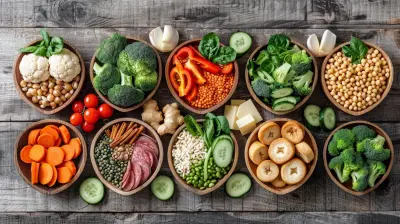Dealing with Postpartum Depression: Support and Recovery
28 May 2025
Let’s get real for a second—bringing a new life into the world is a big deal. It’s messy, beautiful, exhausting, and emotional all at once. But what happens when the afterglow of childbirth fades and you're left feeling overwhelmed, sad, and disconnected? If you’re nodding along, you’re not alone. This could be more than the “baby blues.” You might be dealing with postpartum depression (PPD).
And guess what? That’s okay. There’s zero shame in it, and there’s a way forward. So, let’s talk about it—openly, honestly, and with the understanding that you’re stronger than you think.

What is Postpartum Depression?
Alright, first things first—what exactly is postpartum depression?PPD is a serious mood disorder that can affect women after childbirth. Unlike the common "baby blues" (which usually fade within two weeks postpartum), postpartum depression can linger for months and it doesn’t just “go away with time.” It can sneak up on you and seriously impact your well-being, your relationship with your baby, and your day-to-day life.
So, if you're feeling persistently sad, anxious, irritable, or just...off, you're not going crazy. You're not failing. You're probably experiencing something very real and very treatable.

Recognizing the Symptoms
You might ask yourself, “Is what I’m feeling normal?” Let’s break down some common signs of PPD:- Persistent sadness or hopelessness
- Crying more than usual and for no clear reason
- Lack of interest or pleasure in activities
- Difficulty bonding with your baby
- Feeling worthless, guilty, or like a bad mom
- Insomnia or sleeping too much
- Changes in appetite
- Fatigue or lack of energy
- Fear of being alone with your baby
- Thoughts of harming yourself or your baby
Sound familiar? Even if only a few of these resonate, it’s worth digging deeper. These aren’t just “new mom jitters.” You don’t need to check every box to seek support.

What Causes Postpartum Depression?
Honestly, there’s no single cause. PPD is like a puzzle—a mix of physical, emotional, and environmental pieces.Hormonal Havoc
Let’s start with hormones. After birth, estrogen and progesterone levels drop dramatically. That crash? It’s no joke. These hormonal shifts can mess with your mood in a major way.Sleep Deprivation
You’re likely running on empty (and cold coffee). Lack of sleep can throw everything out of whack, including your ability to regulate emotions.Emotional Pressure
Society paints this picture of motherhood as magical, instinctive, and always joyful. So when you’re not experiencing that sunshine and rainbows moment, the guilt hits hard.Lifestyle & Support Systems
Are you alone most of the day? Struggling with financial pressure? Dealing with relationship tension? All of these factors pile up and can tip the mental health scale.
You Are Not Alone
One of the most comforting things to know? Postpartum depression is incredibly common.Roughly 1 in 7 women experience PPD. That means millions of moms around the world are walking through the same storm. It’s not just happening to you, and more importantly—it’s not your fault.
Talking About It Matters—A Lot
Opening up is hard. You might feel embarrassed, scared, or ashamed. But let me ask you—would you hesitate to tell someone you had the flu or broke your arm? Probably not.Mental health deserves that same kind of transparency and care. Postpartum depression isn’t a character flaw or weakness. It’s a medical condition. Asking for help is not only brave—it’s necessary.
Where to Begin: Seeking Support
Let’s talk game plan. Dealing with postpartum depression isn't about "snapping out of it." It's about creating a system that actually helps you heal. Here’s how to get started:1. Talk to a Medical Professional
First stop: your OB-GYN or primary care doctor. They’ve seen this before and can help guide you toward the right treatment path—whether that’s therapy, medication, or both.Don’t wait for your next scheduled appointment if you’re struggling. Make the call. Your mental health is just as important as your physical recovery.
2. Consider Therapy
Therapists who specialize in postpartum issues can work wonders. Cognitive Behavioral Therapy (CBT), in particular, has proven super effective for treating PPD. It helps you recognize negative thought patterns and replace them with healthier coping mechanisms.Don’t like the idea of face-to-face meetings? Great news—virtual therapy is legit and becoming more accessible every day.
3. Medication Might Help
Sometimes, talk therapy alone isn’t enough. That’s where antidepressants come in. When prescribed and monitored by a healthcare provider, they can be safe and effective—even if you’re breastfeeding. Don’t let stigma stop you from considering all your options.4. Lean on Your Tribe
Your support system can be a total game-changer. Whether it’s your partner, family, friends, or an online mom group—don’t try to white-knuckle your way through this alone.Let people help. Ask them to babysit, bring over food, or just listen. You don’t have to do everything. (Seriously, put the laundry down.)
Practical Self-Care Tips for Recovery
Recovery doesn't happen overnight. It’s a process—slow and steady. But there are small, intentional steps you can take to support yourself each day.Prioritize Sleep (Whenever You Can)
Yes, everyone says “sleep when the baby sleeps.” Annoying advice, but they’ve got a point. Even short naps can add up. And if you can tag-team night feedings with a partner—that’s clutch.Nourish Your Body
You don’t need to go full-blown wellness guru, but eating nutritious meals helps stabilize hormones and improve mood. Think whole foods—lean proteins, leafy greens, fruits, and healthy fats. And drink water like it’s your day job.Move Your Body
Exercise isn't just for “getting your body back.” It’s a natural antidepressant. Go for a walk with the stroller or do a 10-minute yoga flow during nap time. Anything to get those endorphins flowing.Slow Down Social Media
Scrolling through perfect baby pics and influencer moms can feel like a gut punch. Unfollow or mute anything that makes you feel less-than. Your journey doesn’t need to look like anyone else’s.Journal Your Thoughts
Let it all out—no filter needed. Journaling helps you process emotions and track your healing over time. Plus, it’s a great reminder that even on the rough days, you’re making progress.
How Partners and Loved Ones Can Help
If you're reading this on behalf of a new mom—thank you. You’re already making a difference by trying to understand.Here’s how you can step up:
- Listen without judgment
- Offer practical help (laundry, meals, errands)
- Encourage professional support
- Remind her she’s doing her best
- Be patient—it’s a marathon, not a sprint
Sometimes just saying, “I’m here, and I see you,” can be the lifeline she needs.
Long-Term Healing: More Than Just Surviving
Recovery from postpartum depression doesn’t mean you go back to your “old self.” It’s about creating a new version of you—one that’s resilient, supported, and empowered.You might surprise yourself with how strong you become. Through therapy, connection, and time, you’ll start feeling like you again—maybe even better than before.
When It’s More Severe: Postpartum Psychosis
Let’s not ignore this. In rare cases (about 1–2 in 1,000 births), moms experience a condition called postpartum psychosis. This is more extreme than PPD and includes delusions, hallucinations, confusion, and erratic behavior.It’s a medical emergency and requires immediate attention. If you or someone you love shows these signs, get help right away—call a doctor or go to the ER.
Final Thoughts: You're Not Broken
Motherhood is tough enough without pretending like everything’s perfect. If you’re dealing with postpartum depression, please know you’re not alone, you’re not broken, and there’s absolutely no shame in asking for help.You’ve got this—one day, one moment, one breath at a time. With the right support, you will heal. And when you do, you’ll realize just how powerful you really are.
all images in this post were generated using AI tools
Category:
Womens HealthAuthor:

Jackson Mahoney
Discussion
rate this article
3 comments
Farrah Hunter
This article offers valuable insights into the challenges of postpartum depression, highlighting the importance of support and understanding. It’s crucial to normalize discussions around mental health in new mothers, as well as encourage seeking help. A compassionate approach, both from loved ones and professionals, can significantly aid in the recovery process.
June 15, 2025 at 4:02 PM

Jackson Mahoney
Thank you for your thoughtful comment! I'm glad you found the insights valuable. Normalizing these discussions is key to fostering a supportive environment for new mothers.
Garrett Martin
Embrace your strength and seek support! Healing from postpartum depression is a journey, not a destination. You are not alone—together, we can rise and thrive!
May 30, 2025 at 4:28 AM

Jackson Mahoney
Thank you for this uplifting reminder! Healing is indeed a journey, and support is vital. Let’s continue to lift each other up!
Wynter Rogers
“Like a ninja wearing fuzzy slippers, tackling postpartum depression with love and snacks!”
May 29, 2025 at 3:01 AM

Jackson Mahoney
That's a unique and delightful image! Embracing humor and self-care, like snacks and comfort, can truly aid in the journey of recovery.



